Vegan Globetrotter is supported by our audience. When you purchase through one of our links, we may earn a small affiliate commission. As an Amazon Associate I earn from qualifying purchases. Your cost is not affected.
==================
Plant based sources of omega 3 are more than just alternatives to fish-derived nutrients—they are a powerful way to support a healthy heart and body. I’ve come across the remarkable benefits of omega-3s, including their ability to lower triglycerides, regulate blood pressure, and reduce inflammation, all of which play a critical role in overall wellness. For those following a vegan lifestyle or simply looking to incorporate more plant-based nutrition into their diet, omega-3s offer an excellent opportunity to nourish the body naturally. This article dives into the essential role of these fatty acids and how you can embrace their benefits in a sustainable and health-conscious way.
Plant Based Sources of Omega 3 for Vegans: Nourishing Your Body Naturally
Omega-3 fatty acids play a key role in our health. They help our hearts, brains, and bodies work well. Many people think fish is the only way to get omega-3s. But this isn’t true.

Key Takeaways
- Omega-3 Benefits: Essential for heart, brain, and reducing inflammation, omega-3s can be sourced sustainably from plants.
- Top Sources: Chia seeds, flaxseeds, hemp seeds, walnuts, algal oil, and seaweed are rich, versatile options.
- Vegan-Friendly: These sources support wellness without relying on animal products.
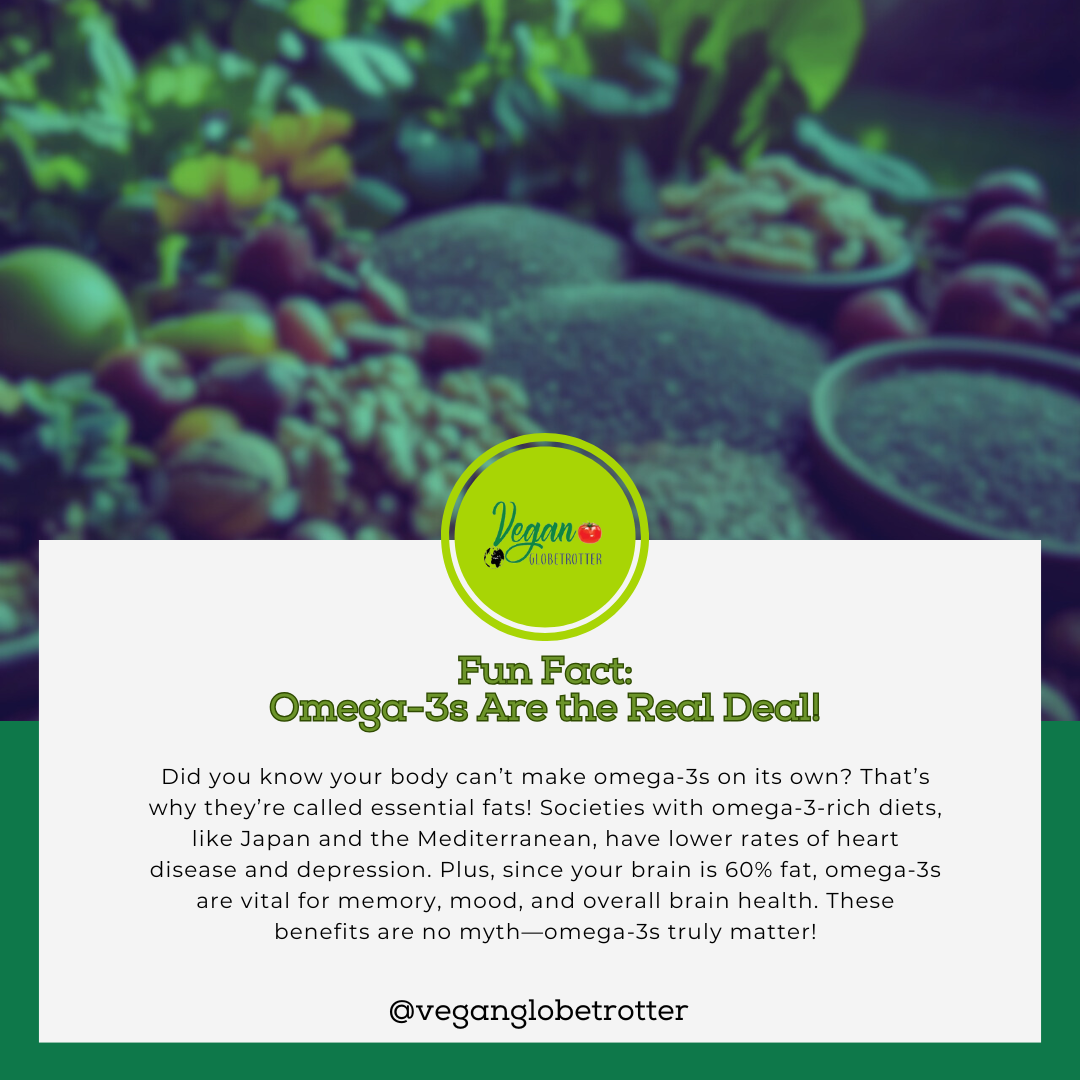
Sustainable Wellness in Every Capsule
A vegan omega-3 supplement is a game-changer for plant-based lifestyles, offering essential fatty acids crucial for heart health, brain function, and reducing inflammation. It’s not just about health—it’s a sustainable and ethical alternative to fish oil, free from the environmental concerns of fish harvesting. For maximum benefits, choose a high-quality supplement rich in EPA and DHA, as plant-based sources like flaxseeds mainly provide ALA, which your body must convert into these vital forms.
Plant-Based Omega-3s: A Vegan-Friendly Alternative to Fish
Plants can give us omega-3s too. This is great news for vegans and those who don’t eat fish. Many plants are rich in omega-3 fatty acids, offering a way for vegans to meet their needs without eating animal products. These plant sources can be easy to add to meals and snacks.
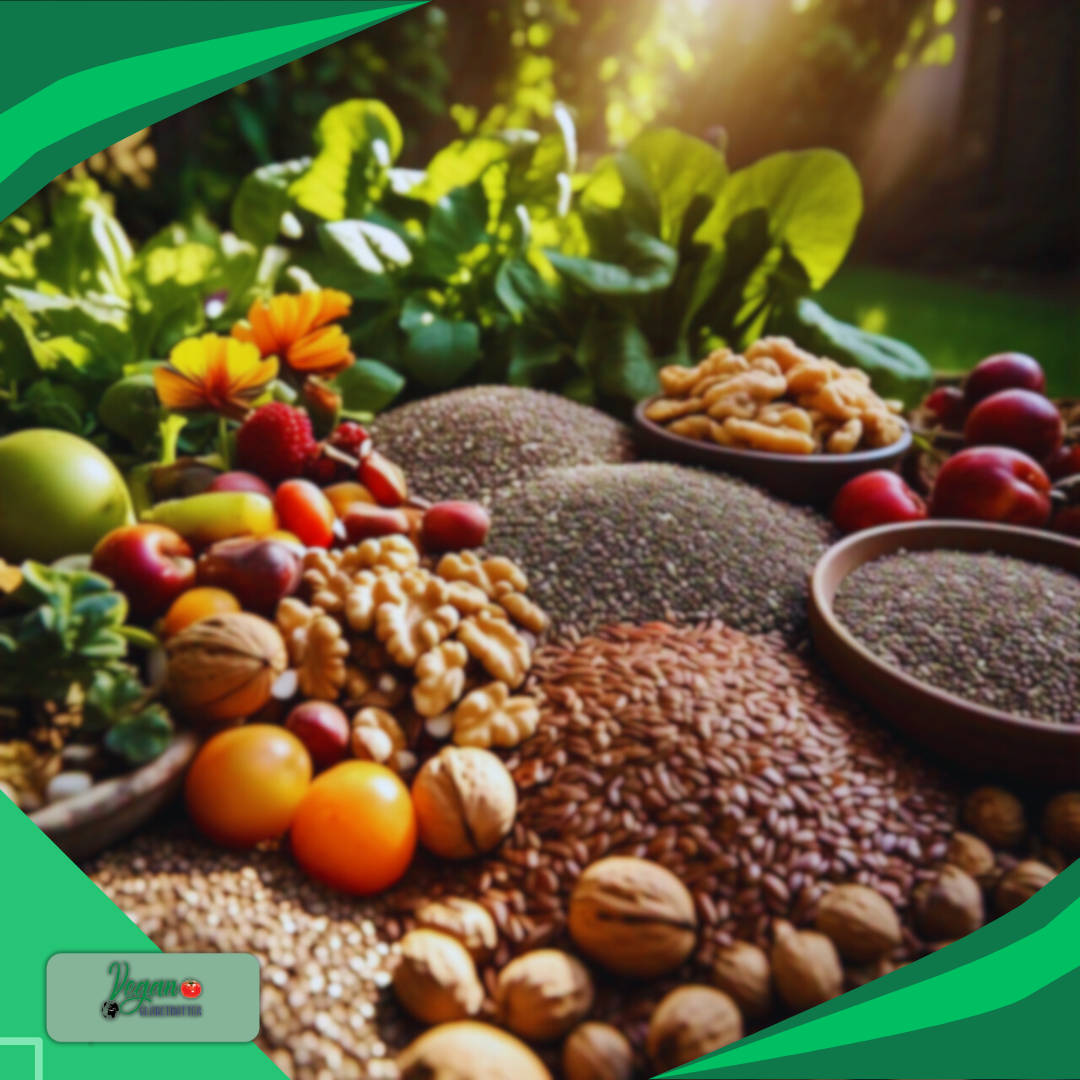
1) Chia Seeds

Chia seeds are a tiny powerhouse of nutrition for vegans seeking omega-3 fatty acids. These small black or white seeds pack a big punch when it comes to essential nutrients.
Chia seeds contain more omega-3s than salmon by weight. This makes them an excellent choice for plant-based eaters looking to boost their intake of this important fatty acid.
One ounce of chia seeds provides a significant portion of the daily recommended fiber intake. They’re also a good vegan source of calcium, supporting bone health.
Chia seeds are incredibly versatile in the kitchen. They can be sprinkled on top of oatmeal, yogurt, or salads for a nutritious crunch. When soaked in liquid, they form a gel-like consistency.
This gel-forming property makes chia seeds useful as an egg substitute in vegan baking. They can also be used to create creamy puddings and simple two-ingredient jams.
Adding chia seeds to smoothies is another easy way to incorporate them into a vegan diet. They blend well and add a boost of omega-3s without changing the flavor significantly.
For those new to chia seeds, start with small amounts and gradually increase intake. It’s important to drink plenty of water when consuming chia seeds, as they absorb liquid.
2) Flaxseeds

Flaxseeds are a powerhouse of omega-3 fatty acids for vegans. These tiny seeds pack a big nutritional punch. They deliver more ALA omega-3 fatty acids than any other known food.
Just a small amount of flaxseeds can provide a significant boost to omega-3 intake. Two tablespoons of whole flaxseeds contain about 4.7 grams of omega-3s. That’s a lot in a small package!
Flaxseeds are versatile and easy to add to many dishes. People can sprinkle them on cereal, mix them into smoothies, or use them in baking. Ground flaxseeds are easier for the body to digest and absorb nutrients from.
These seeds offer more than just omega-3s. They’re also rich in fiber and lignans, which are plant compounds with antioxidant properties. This makes flaxseeds a great addition to any vegan diet.
Vegans can use flaxseed oil as well. It’s a concentrated source of ALA omega-3s. However, the whole seeds provide more overall nutritional benefits. They’re a more complete food with fiber and other nutrients.
Flaxseeds have a mild, nutty flavor that blends well with many foods. They can add a pleasant crunch to salads or yogurt alternatives. With their nutritional profile and versatility, flaxseeds are a top choice for vegans seeking omega-3s.
3) Hemp Seeds

Hemp seeds are a great plant-based source of omega-3 fatty acids for vegans. These small seeds pack a big nutritional punch.
Hemp seeds contain about 3,000 mg of ALA omega-3s in just 3 tablespoons. This amount gives you more than the daily recommended intake.
Hemp seeds have a mild, nutty flavor. They can be eaten raw or toasted. Many people like to sprinkle them on salads, yogurt, or oatmeal.
You can also add hemp seeds to smoothies for an omega-3 boost. Some folks use them in baking or as a crunchy topping for roasted vegetables.
Hemp seed oil is another option. It has even more omega-3s than the whole seeds. The oil works well in salad dressings or drizzled over cooked dishes.
One great thing about hemp seeds is their omega-6 to omega-3 ratio. It’s usually between 2:1 and 3:1, which many think is good for health.
Hemp seeds also offer protein and fiber. They’re easy to find in most grocery stores nowadays. You can often spot them in the health food section.
Adding hemp seeds to your diet is a simple way to boost your omega-3 intake. They’re versatile and tasty, making them a favorite among many vegans.
4) Walnuts

Walnuts are a tasty and nutritious snack for vegans looking to boost their omega-3 intake. These crunchy nuts are packed with alpha-linolenic acid (ALA), a type of omega-3 fatty acid found in plant foods.
Just a small handful of walnuts can provide a significant amount of omega-3s. A quarter cup of walnuts contains about 2.6 grams of ALA, which is more than the daily recommended intake for most adults.
Walnuts are versatile and easy to add to many dishes. They can be sprinkled on top of oatmeal, blended into smoothies, or used as a crunchy topping for salads.
For those who enjoy baking, walnuts make a great addition to breads, muffins, and cookies. They can also be ground into a flour-like consistency for use in recipes.
Walnuts offer more than just omega-3s. They’re also rich in protein, fiber, and various vitamins and minerals. This makes them a great all-around food for vegans and non-vegans alike.
When buying walnuts, look for ones that are fresh and not rancid. Store them in a cool, dry place or in the refrigerator to keep them fresh longer.
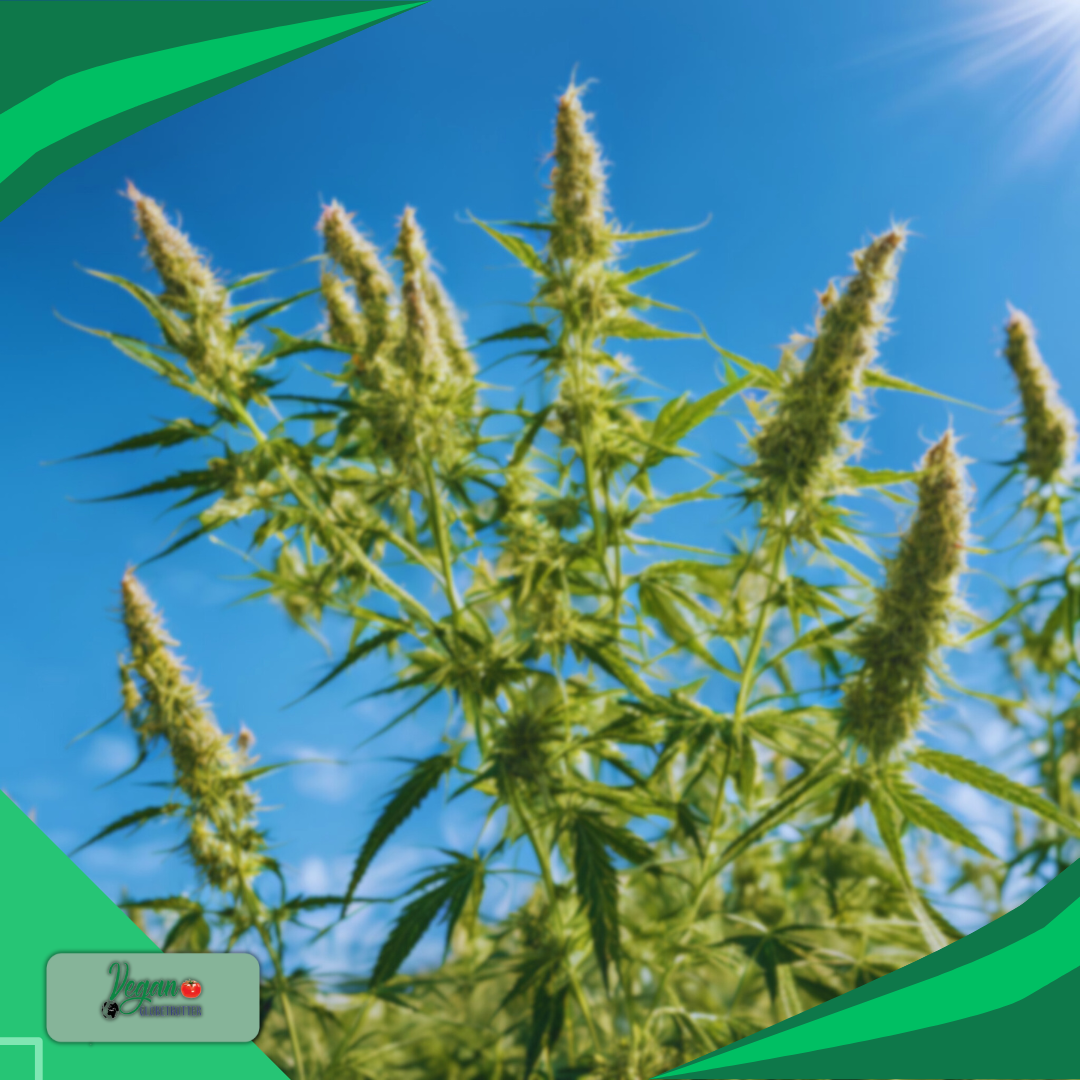
Vegan Omega-3s: Algae-Based Powerhouse
5) Brussels Sprouts

Brussels sprouts are a tasty and nutritious veggie that vegans can enjoy for their omega-3 content. These mini cabbages pack a punch when it comes to healthy fats.
A cup of cooked Brussels sprouts gives you about 0.28 grams of omega-3 fatty acids. That’s a good amount for a vegetable side dish.
Brussels sprouts are easy to add to your meals. You can roast them, steam them, or even eat them raw in salads. They have a slightly nutty flavor that many people love.
Besides omega-3s, Brussels sprouts are full of other good stuff. They have lots of fiber, vitamins, and minerals. This makes them a great choice for overall health.
Try adding Brussels sprouts to your diet a few times a week. You can pair them with other plant-based omega-3 sources for a well-rounded meal.
Remember, eating a variety of plant foods is key for vegans to get enough omega-3s. Brussels sprouts are just one piece of the puzzle, but they’re a yummy and healthy option to include.
6) Algal Oil

Algal oil is a game-changer for vegans looking to boost their omega-3 intake. It’s made from marine algae, which is where fish get their omega-3s from in the first place.
This oil is special because it’s one of the few plant-based sources that contain both DHA and EPA, two important types of omega-3 fatty acids. Most other vegan sources only provide ALA, which the body has to convert to DHA and EPA.
Vegans can easily add algal oil to their diet through supplements. These come in capsule form, making them simple to take daily. Some people even mix liquid algal oil into smoothies or salad dressings.
Research suggests that algal oil might be just as good as fish oil for heart health. Some studies have shown that it may help protect against cardiovascular risk factors similarly to fish oil.
For those worried about taste, algal oil is usually odorless and flavorless. This makes it a great option for people who don’t like the fishy taste of other omega-3 supplements.
Algal oil is also environmentally friendly. Unlike fish oil, it doesn’t contribute to overfishing or harm marine ecosystems. It’s a sustainable choice that aligns well with vegan values.
While algal oil supplements can be more expensive than some other omega-3 sources, many vegans find the benefits worth the cost. It’s a direct way to get important nutrients without relying on animal products.
7) Perilla Oil

Perilla oil comes from the seeds of the perilla plant. This plant grows in Korea and some parts of Southeast Asia.
Perilla oil is very rich in omega-3 fatty acids. It contains a type of omega-3 called alpha-linolenic acid (ALA).
The amount of ALA in perilla oil is impressive. About 64% of this oil is made up of ALA omega-3s.
One tablespoon of perilla oil has nearly 9,000 mg of ALA. This is a lot more than most people need in a day.
Vegans can use perilla oil in cooking or as a salad dressing. It has a nutty flavor that many people enjoy.
Like other plant oils, perilla oil doesn’t have EPA or DHA. These are two other types of omega-3s. But the body can change some ALA into EPA and DHA.
Perilla oil can go bad quickly. It’s best to keep it in the fridge and use it soon after opening.
While perilla oil is great for omega-3s, it’s good to eat other sources too. This helps make sure you get all the nutrients you need.
8) Echium Oil

Echium oil is a plant-based source of omega-3 fatty acids that’s gaining attention among vegans. It comes from the seeds of the Echium plantagineum plant, also known as purple viper’s bugloss.
This oil is special because it contains stearidonic acid (SDA), a type of omega-3 that the body can easily convert to EPA. EPA is usually found in fish oil, making echium oil a great option for vegans.
Echium oil also has alpha-linolenic acid (ALA) and gamma-linolenic acid (GLA). These fatty acids help reduce inflammation and support heart health.
Vegans and vegetarians can benefit from echium oil as an alternative to fish oil. It’s a convenient way to get important omega-3s without consuming animal products.
Adding echium oil to your diet is simple. You can take it as a supplement or use it in salad dressings. Some people mix it into smoothies or drizzle it over cooked vegetables.
While echium oil is promising, it’s always a good idea to talk to a doctor before starting any new supplement. They can help you figure out the right amount for your needs.
9) Natto

Natto is a traditional Japanese food that offers vegans a unique source of omega-3 fatty acids. It’s made from fermented soybeans and has a sticky, slimy texture with a strong flavor.
Natto contains a good amount of alpha-linolenic acid (ALA), which is a type of omega-3 fat found in plant foods. The body can convert some ALA into EPA and DHA, the forms of omega-3s typically found in fish.
Besides omega-3s, natto is packed with other nutrients. It’s high in protein, fiber, and vitamins K2 and B12. These nutrients support bone health, heart function, and energy levels.
Eating natto may take some getting used to due to its strong smell and unusual texture. Some people enjoy it on rice, in sushi rolls, or mixed into salads.
For those new to natto, starting with small amounts can help. Gradually increasing intake allows time to adjust to its unique qualities. With regular consumption, many people grow to appreciate natto’s distinctive taste and health benefits.
10) Seaweed

Seaweed is a great plant-based source of omega-3 fatty acids for vegans. It’s one of the few plant sources that provides EPA and DHA, which are usually found in fish.
There are many types of seaweed that offer omega-3s. Nori, the type used in sushi rolls, is a popular choice. Spirulina and chlorella are also good options.
Dried seaweed nori can be a tasty snack or addition to meals. Just three sheets provide about 135 mg of omega-3.
Seaweed is easy to add to a vegan diet. It can be sprinkled on salads, soups, or rice dishes. Some people enjoy seaweed snacks as a crunchy treat.
It’s worth noting that raw seaweed tends to have higher omega-3 content than processed forms. However, any form of seaweed can contribute to a vegan’s omega-3 intake.
While seaweed is nutritious, it’s best to eat it in moderation. Some types can be high in iodine, so it’s a good idea to vary omega-3 sources in a vegan diet.
Health Benefits of Omega-3 for Vegans

Omega-3 fatty acids play a vital role in promoting health for vegans. These essential fats support cardiovascular function and brain health in important ways.
Supporting Heart Health
Omega-3s help keep the heart healthy in several ways. They can lower blood pressure and reduce triglycerides, which are risk factors for heart disease. These fats also have anti-inflammatory effects that protect blood vessels.
For vegans, getting enough omega-3s may help offset the lack of fish in their diet. Plant sources like flax, chia, and hemp seeds provide alpha-linolenic acid (ALA). The body can convert some ALA to EPA and DHA, the forms found in fish.
Eating omega-3 rich foods regularly supports overall heart function. It may lower the risk of irregular heartbeats and blood clots. This can be especially beneficial for vegans as they age.
Cognitive Function
Omega-3 fatty acids are crucial for brain health. They make up part of brain cell membranes and help with communication between cells. Getting enough omega-3s may support memory and learning.
For vegans, foods like walnuts and algae oil can provide beneficial omega-3s for the brain. These fats play a role in mood and may help reduce symptoms of depression.
Omega-3s are also important for brain development. Pregnant vegans should pay special attention to getting enough through diet or supplements. This helps ensure proper growth of the baby’s brain and eyes.

Understanding Omega-3 Fatty Acids

Omega-3 fatty acids are essential fats that play crucial roles in our bodies. They support heart health, brain function, and help reduce inflammation.
Types of Omega-3s: ALA, EPA, DHA
There are three main types of omega-3 fatty acids:
- ALA (alpha-linolenic acid)
- EPA (eicosapentaenoic acid)
- DHA (docosahexaenoic acid)
ALA is found in plant-based foods like flaxseeds, chia seeds, and walnuts. It’s the most common omega-3 in vegan diets.
EPA and DHA are typically found in fatty fish. For vegans, these can be harder to get. Some algae-based supplements offer EPA and DHA.
Conversion Process in the Body
Our bodies can convert ALA into EPA and DHA. This process isn’t very efficient, though. Only a small amount of ALA gets changed into EPA and DHA.
For vegans, this means eating plenty of ALA-rich foods is important. It helps ensure enough EPA and DHA are made in the body.
Some people may convert ALA better than others. Factors like age, gender, and overall health can affect this process.
Vegans can still get enough omega-3s through diet and supplements. Eating a variety of plant-based omega-3 sources is key.
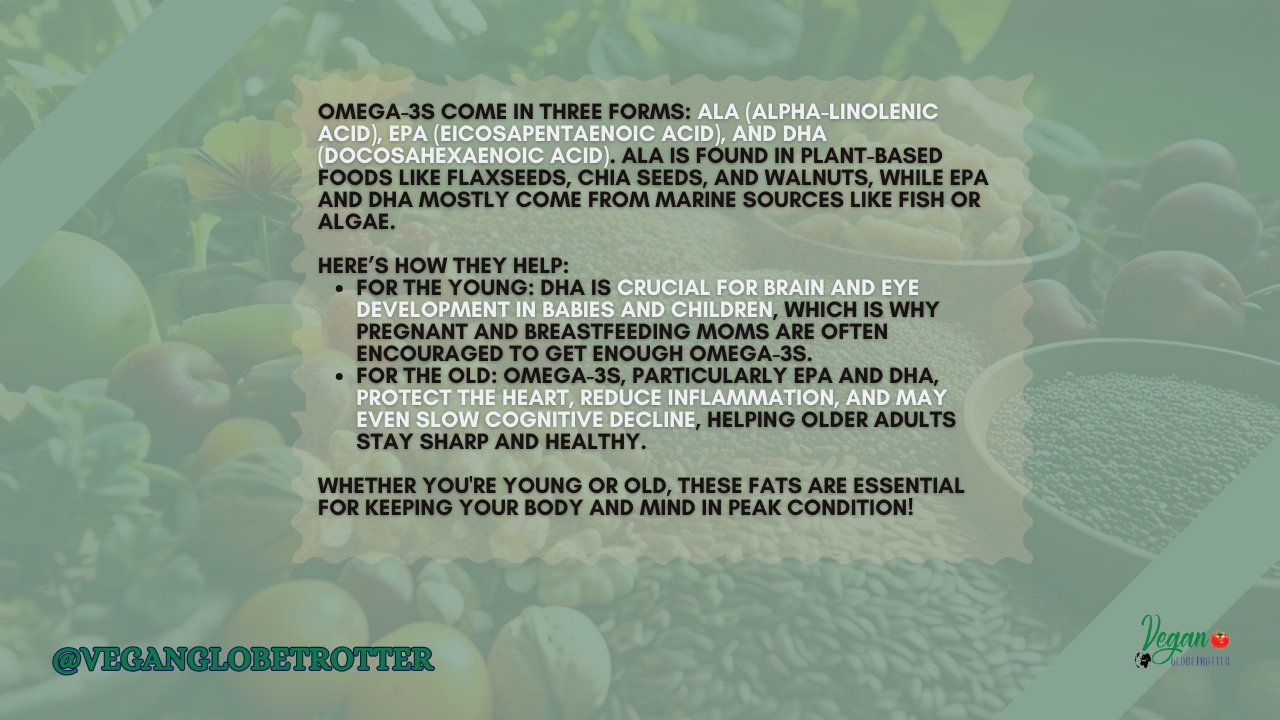
Plant Based Sources of Omega-3: A Natural Path to Wellness
Thank you for taking the time to read this article! As we’ve explored, plant-based sources of omega-3 offer a natural and effective way to support heart health, regulate blood pressure, and reduce inflammation—all while aligning with a vegan or plant-focused lifestyle. The benefits of omega-3s are undeniable, and this article has shown how they can be incorporated into your daily diet without relying on animal products.
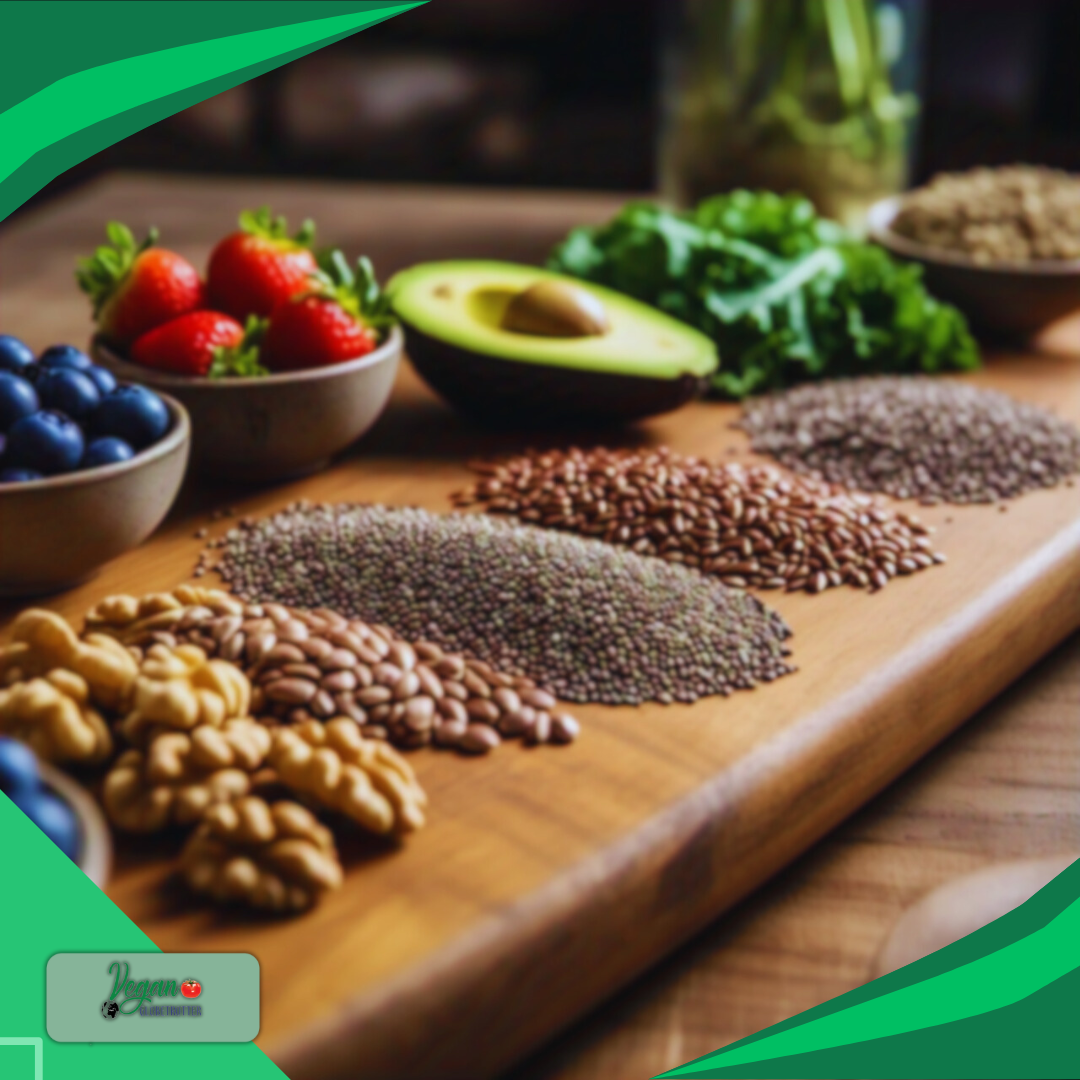
Now that you’ve discovered these powerful plant-based options, why not take the next step? Start adding these sources to your meals and experience the difference for yourself. If you found this article helpful, share it with others who could benefit from a plant-based approach to better health!
Frequently Asked Questions

Vegans have many options for getting omega-3 fatty acids from plant-based sources. Seeds, nuts, and certain vegetables provide ALA, while algae-based supplements offer EPA and DHA.
How can vegans get enough omega-3 in their diet?
Vegans can get omega-3s by eating ALA-rich foods like chia seeds, flaxseeds, and walnuts. Adding these to meals helps boost omega-3 intake. Brussels sprouts also contain some omega-3s.
Hemp seeds are another good choice. They’re easy to sprinkle on salads or blend into smoothies.
What are the best vegan supplements for omega-3?
Algae-based supplements are the top choice for vegans seeking EPA and DHA. These provide the same omega-3s found in fish oil, but from a plant source.
Look for supplements that list the amounts of EPA and DHA on the label. This helps ensure you’re getting enough of these important fatty acids.
Can a plant-based diet provide adequate EPA and DHA?
A plant-based diet can provide ALA, which the body converts to EPA and DHA. But this conversion is limited.
Vegans may have lower levels of EPA and DHA. Algae supplements can help boost these levels directly.
What are some high omega-3 fruits and vegetables for a vegan diet?
While fruits and veggies aren’t the highest sources, some do contain omega-3s. Brussels sprouts are a good choice.
Kidney beans offer some ALA too. They also provide protein and fiber, making them a nutritious addition to meals.
Are there plant-based sources of omega 3-6-9?
Yes, some plants provide a mix of omega-3, omega-6, and omega-9 fatty acids. Chia seeds and flaxseeds are good examples.
Hemp seeds also contain this trio of fatty acids. They’re versatile and can be added to many dishes.
How do vegans get DHA and EPA without fish?
Vegans can get DHA and EPA directly from algae-based supplements. These provide the same omega-3s found in fish, but from a vegan source.
Eating ALA-rich foods like flaxseeds and walnuts also helps. The body can convert some ALA to EPA and DHA, though not very efficiently.



Don't miss out
when new recipes and information are added!
Join our newsletter for free recipes,
healthy living inspiration, and special offers
You have Successfully Subscribed!